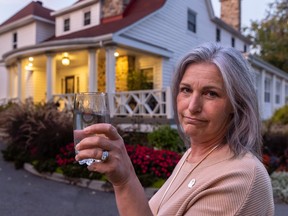The change would affect more than 143,000 people in Pointe-Claire, Beaconsfield, Kirkland, Baie-D’Urfé, Dollard-des-Ormeaux and Dorval.

Article content
The city of Montreal is proposing to stop adding fluoride to the West Island’s tap water starting in 2025, but at least one affected municipality is unsatisfied with the plan.
If a vote by the agglomeration council passes, the change would affect more than 143,000 people in Pointe-Claire, Beaconsfield, Kirkland, Baie-D’Urfé, Dollard-des-Ormeaux and Dorval.
Advertisement 2
Story continues below
Article content
The water plants in Pointe-Claire and Dorval, which treat the majority of water in the West Island, are the only plants that fluoridate their drinking water.
Across the rest of the island of Montreal, tap water has never been fluoridated.
Factors that led to the city’s proposal include the safety of city employees handling corrosive chemicals, uncertainty around fluoride’s health effects, and the high maintenance cost of fluoridation, Montreal city councillor Maja Vodanovic said.
“We don’t want to use water as a vehicle for medication. We don’t want to use water as a vehicle for pharmaceuticals,” Vodanovic told The Gazette.
A spokesperson for Vodanovic’s office said the cost of keeping the fluoridation program would be $19 million to make the necessary upgrades to the plants, plus $330,000 per year in maintenance.
“We have many, many, many priorities right now in Montreal for water,” Vodanovic said, in reference to the high cost of the fluoridation program. She has been dealing with Montreal’s aging water infrastructure first-hand, since multiple water mains have ruptured across the city over the past three months. “We have flooding, there’s so much to do.”
Article content
Advertisement 3
Story continues below
Article content
The agglomeration council, which authorizes shared expenses across the island of Montreal, will vote on terminating the fluoridation program on Dec. 24.
But Heidi Ektvedt, mayor of Baie-D’Urfé, says the affected municipalities should have been consulted beforehand.
“The towns that are implicated should be consulted and our population should be consulted, but that doesn’t appear at the moment to be the plan,” Ektvedt said.
“We did reach out to Montreal as a city and we did request a meeting with them. That meeting didn’t happen the way we had asked for it, and instead we’re presented with a fait accompli.”
Vodanovic says West Island municipalities will have the opportunity to voice their perspectives at the agglomeration meeting in December.
Is the fear around fluoride warranted?
Municipal water fluoridation is endorsed by public health bodies such as the World Health Organization, the Canadian Dental Association and the Public Health Agency of Canada (PHAC). It has been shown to reduce tooth decay by 25 per cent in children and adults, according to the PHAC.
Advertisement 4
Story continues below
Article content
Even the Montreal Regional Public Health recognizes the fluoridation of drinking water as “the most effective and economical way of providing the whole population with enough fluoride to prevent dental caries.”
Paul Allison, a professor of dental public health at McGill University, thinks the city’s plan to stop water fluoridation in the West Island is “very unfortunate.”
“The good thing about (water fluoridation) compared to other forms of fluoride is that everyone gets it. They don’t have to brush their teeth, they don’t have to go to the dentist,” Allison said.
“There have been a few other studies that have raised questions around other health issues,” he said. “But the vast, vast, vast majority of thousands of studies across the world have shown the beneficial effects if it’s at the right level of fluoride,” with “no detrimental effects.”
Vodanovic pointed to one 2024 study that suggests drinking water containing more than 1.5 milligrams of fluoride per litre is consistently associated with lower IQs in children. It’s one of several studies that points to fluoride’s impact on IQ levels and learning disabilities.
The West Island facilities administer only 0.7 milligrams per litre, which is the recommended amount from the PHAC. The same U.S. study said there was insufficient data to determine if that 0.7 mg level had a negative effect on children’s IQ. Despite this, Vodanovic is still concerned.
“Children also brush their teeth with fluoride,” Vodanovic said. “So if you combine the brushing of the teeth and the water, we don’t know how much each child actually gets.”
The Pointe-Claire and Dorval plants supply approximately five per cent of drinking water on the island. There’s only one other Quebec plant that fluoridates its water, located in St-Georges, that services its 27,300 residents.
Recommended from Editorial
Advertisement 5
Story continues below
Article content
Article content

Comments